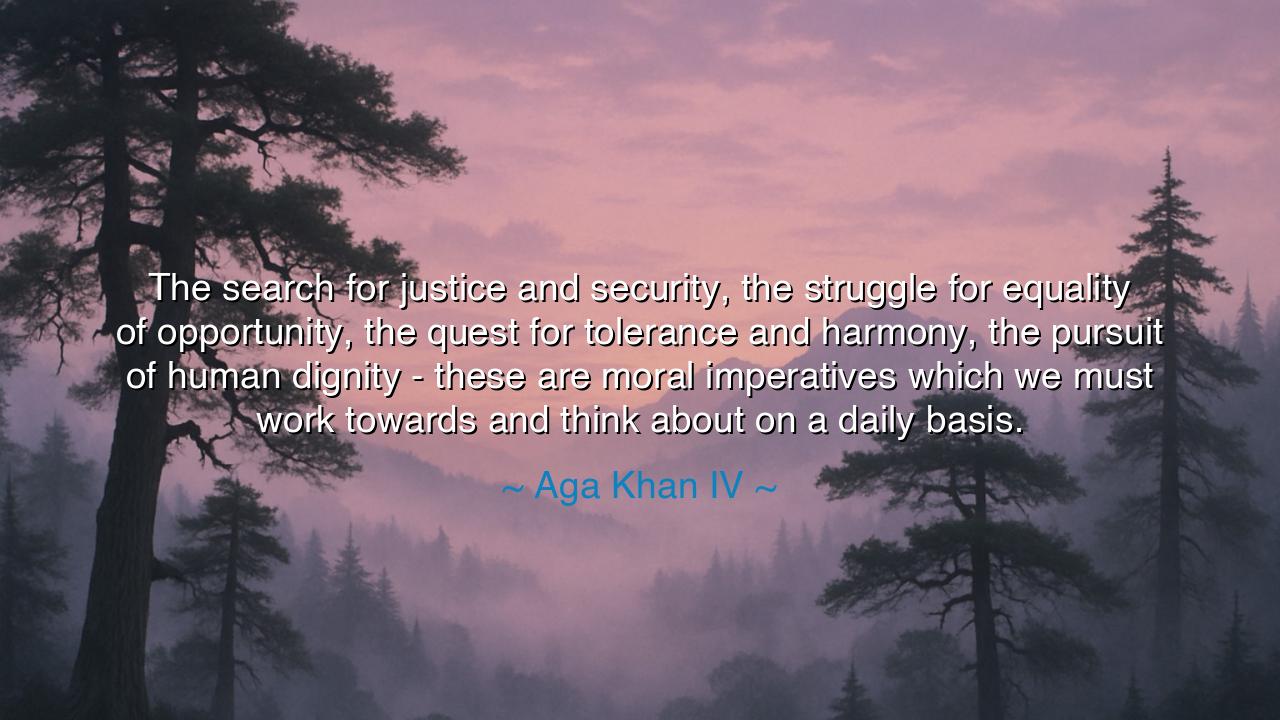
The search for justice and security, the struggle for equality of
The search for justice and security, the struggle for equality of opportunity, the quest for tolerance and harmony, the pursuit of human dignity - these are moral imperatives which we must work towards and think about on a daily basis.






The words of Aga Khan IV — “The search for justice and security, the struggle for equality of opportunity, the quest for tolerance and harmony, the pursuit of human dignity — these are moral imperatives which we must work towards and think about on a daily basis.” — shine like a beacon across the fog of our age. They are not the words of a politician seeking favor, nor of a dreamer lost in ideals; they are the teachings of a man who has walked between power and humility, faith and reason, East and West. In this declaration, Aga Khan IV, spiritual leader of millions, reminds us that the highest work of human life is not conquest or wealth, but the constant striving for moral balance — a daily devotion to the upliftment of humanity.
Born into a lineage of leaders who carried both spiritual and worldly responsibility, His Highness the Aga Khan IV has long spoken of the inseparable bond between ethics and civilization. To him, justice and equality are not mere political ambitions, but spiritual duties. His quote reflects a truth older than nations — that civilization itself rests not on stone or steel, but on moral imperatives. These imperatives — justice, security, equality, tolerance, harmony, dignity — are the pillars upon which peace endures. Yet, he does not speak of them as distant dreams to be achieved once and forgotten. He calls us to daily labor, to think and act upon them each day, as the farmer tends his field and the mason lays his stones, knowing that virtue, like harvest or temple, grows through patience and persistence.
The ancients, too, understood this truth. In every great civilization — from the Vedic sages of India to the philosophers of Greece, from the prophets of the Middle East to the scholars of China — the measure of a people’s greatness was not in its armies, but in its justice and compassion. When rulers forgot this, when wealth and pride replaced humility and care, empires crumbled. The Aga Khan’s words are thus both a teaching and a warning: that if we neglect these moral imperatives, the foundations of our societies will decay, and the light of humanity will grow dim.
Consider the life of Nelson Mandela, who, after decades in prison, emerged not with hatred but with grace. His struggle was not only political but moral — the struggle for equality of opportunity, for justice that heals rather than divides. In his forgiveness of his captors and his insistence on reconciliation, he embodied tolerance and human dignity. He showed that these values are not signs of weakness, but of immense strength. Like the Aga Khan, Mandela understood that peace is not born of silence or surrender, but of moral clarity — the will to see in every human being a reflection of one’s own soul.
Justice and security, the Aga Khan tells us, are not luxuries to be enjoyed when times are good, but necessities to be cultivated even in hardship. True security comes not from weapons, but from the fairness of laws and the trust of citizens. Equality of opportunity means more than charity — it means creating a world where every person, regardless of birth, can rise by effort and virtue. And tolerance and harmony are not passive acceptance but active understanding, the courage to listen when others shout, and to reach across the walls of fear and difference. To pursue these things daily is to walk the path of civilization itself.
Human dignity, he declares, is the crown of all these pursuits. It is the recognition that each life, however small, carries infinite worth. History bears countless examples where this truth was forgotten — in the gulags of the oppressed, in the slavery of the conquered, in the poverty of the ignored. Yet every renaissance, every awakening of humanity, began when someone remembered it. From the Magna Carta to the Universal Declaration of Human Rights, progress has always been born from the moral courage to restore dignity where it was denied.
And so, my children, take this wisdom to heart. Do not wait for kings or governments to bring justice; begin with yourselves. Seek fairness in your dealings, compassion in your speech, and integrity in your work. When you see inequality, do not turn away; when you encounter intolerance, answer with understanding. Let every day be a prayer lived in action — a small contribution to the vast and sacred labor of humanity.
For as Aga Khan IV reminds us, these are not dreams to ponder once and forget — they are imperatives, the moral duties of the living. Justice, equality, tolerance, dignity — these are the fires that must be kept burning, not by the hands of the few, but by the hearts of all. When each person tends that flame within themselves, the world will not need to be saved; it will simply shine, as it was always meant to.






AAdministratorAdministrator
Welcome, honored guests. Please leave a comment, we will respond soon